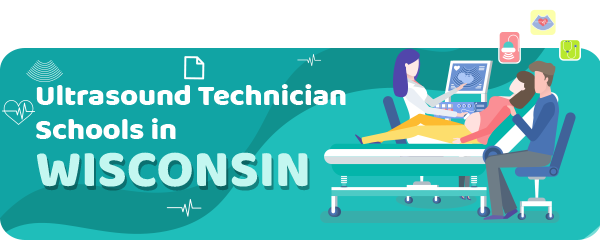Wisconsin provides numerous training schools, so starting a career in the medical field will be easy.
If you want to work as an ultrasound technician in this state, read on for more info on how to start.
Training Requirements
Although licenses are not required in Wisconsin, many hiring companies request them.
In order to get a certification, you need to enroll in a program through a community college or school.
The program you choose should be approved by the Commission on Accreditation of Allied Health Education Programs (CAAHEP).
This will make the licensing process faster, as you will only need to take an exam upon completing the course.
You can opt for a simple diploma that takes about a year to finish.
You can also go for an Associate’s or Bachelor’s degree, which will provide more credentials to get a good job.
These programs typically last between 2 and 4 years.
| School Name | Address |
|---|---|
| Aurora St. Luke’s Medical Center | 180 W. Grange Avenue Milwaukee, WI 53207 |
| Bellin College | 3201 Eaton Road Green Bay, WI 54311 |
| Blackhawk Technical College | 6004 County Road G, Janesville, Wisconsin 53547 |
| Bryant & Stratton College-Wauwatosa | 10950 W Potter Rd Milwaukee West Campus Wauwatosa, WI 53226-3424 |
| Chippewa Valley Technical College | 620 W Clairemont Ave, Eau Claire, Wisconsin 54701 |
| Concordia University | 12800 N Lake Shore Dr, Mequon, Wisconsin 53097 |
| Northeast Wisconsin Technical College | 2740 W Mason St, Green Bay, Wisconsin 54307 |
| University of Wisconsin Hospitals and Clinics | 610 North Whitney Way Suite 440 Madison, WI 53705 |
| University of Wisconsin | 2200 E Kenwood Blvd Milwaukee, WI 53201 |
Most of the accredited programs in this state can be attended online or in person.
The ultrasound tech classes will teach you how to work with technology in order to take pictures of the insides of the patient’s body.
You will also learn how to use effective communication with patients and their families.
Another skill ultrasound techs develop during the training program is record-keeping.
Besides theory, you will also attend practice hours.
In Wisconsin, you can start training as a radiologist in a program accredited by the American Registry of Radiological Technologists (ARRT).
The subjects covered in class include:
- Anatomy
- Physiology
- Medical psychology
- Records management
- Medical ethics
- Imaging technology
Taking a specialization can also help your new career.
In Wisconsin, you can get specialized in:
- Cardiac imaging,
- Radiography,
- Sonography
- MRI tech.
After finishing your program, you have to take an exam managed by American Registry for Diagnostic Medical Sonography.
Wisconsin has numerous exam centers spread throughout the state.
If the program you attended is not accredited, you will need a year of work experience before you can get licensed.
Your certification needs to be renewed every once at 2 years.
For that to happen, you are required to take 24 additional credit hours of continuing education.
Job Opportunities in Wisconsin
Reports released by The U.S. Bureau of Labor Statistics show an 18% growth for ultrasound jobs until 2024.
As an average, those who work in the field earn about $75,358 per year.
Annual Salary Range:| Location | Avg. Annual Salary |
|---|---|
| Milwaukee | $75,717 |
| Madison | $75,282 |
| Green Bay | $73,392 |
| Kenosha | $75,006 |
| Racine | $75,006 |
| Appleton | $73,407 |
| Waukesha | $75,431 |
| Eau Claire | $70,810 |
| Oshkosh | $72,932 |
| Janesville | $75,017 |
Regional Salary in Wisconsin
| Region | Employed | Avg. Annual Salary | Avg. Hourly Pay | Top 10% Annual Salary | Bottom 10% Annual Salary |
|---|---|---|---|---|---|
| Appleton, WI | 70 | $95,160 | $45.75 | $117,050 | $79,570 |
| Eau Claire, WI | 60 | $99,470 | $47.82 | $115,650 | $79,280 |
| Green Bay, WI | 110 | $95,000 | $45.68 | $104,680 | $78,520 |
| Madison, WI | 170 | $100,560 | $48.35 | $120,540 | $83,260 |
| Milwaukee-Waukesha-West Allis, WI | 530 | $99,070 | $47.63 | $120,470 | $79,870 |
| Oshkosh-Neenah, WI | 30 | $92,620 | $44.53 | $105,950 | $78,950 |
* Employment conditions in your area may vary.
This makes the industry a good choice for those who earned an associate’s degree.
The salary you will earn also varies according to your experience level and qualifications.
So, the first thing to do it find the right school with a program that suits your needs.
Some schools also offer scholarships for students who need financial assistance.
Read the full guide: How to Become an Ultrasound Technician
